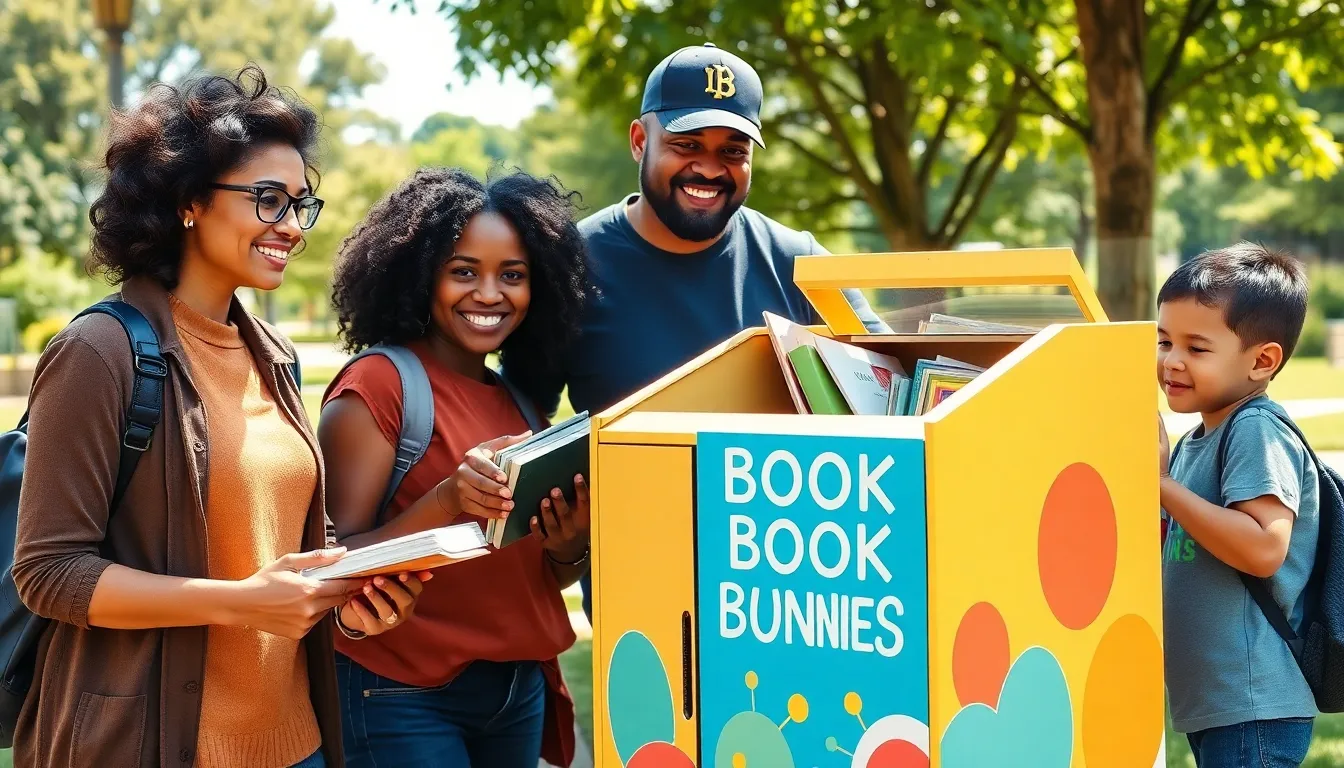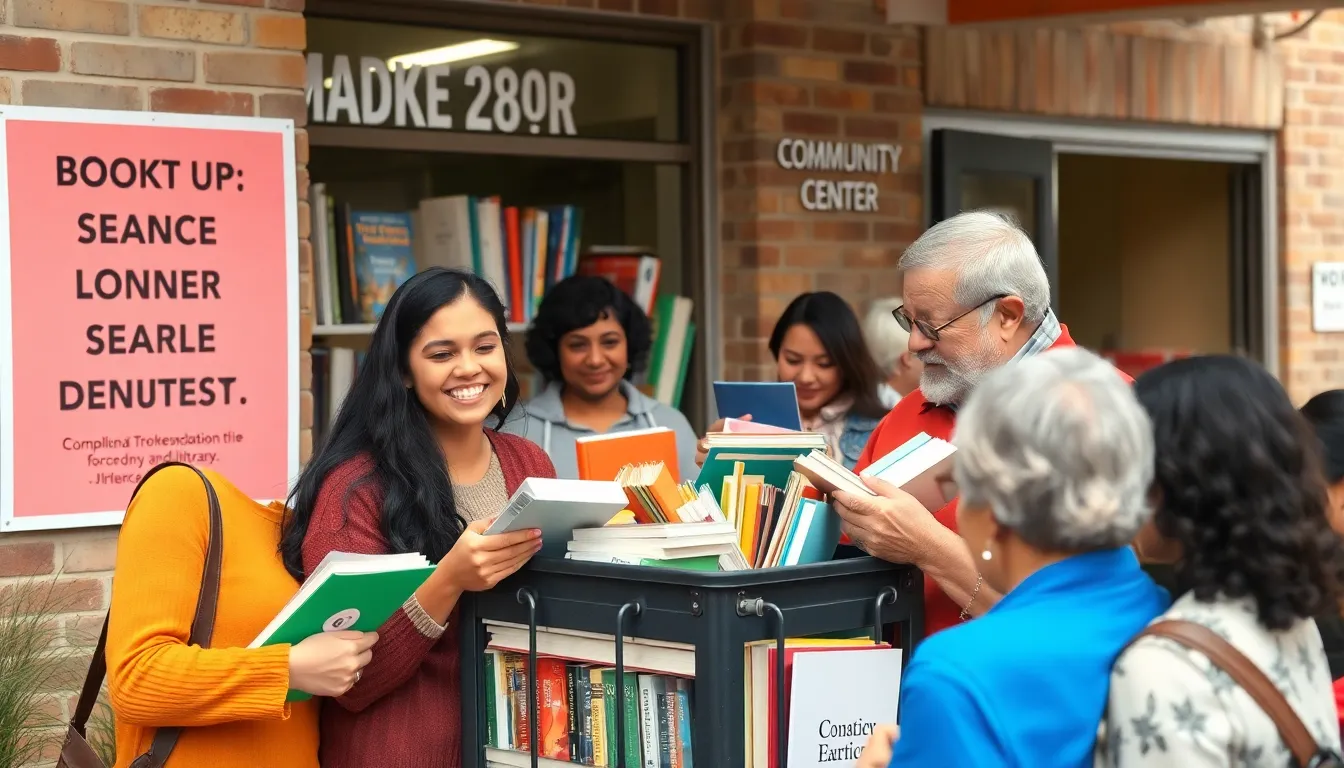Ever stared at that towering stack of books collecting dust and thought, “These could be doing so much more?” Well, it’s time to turn that literary clutter into a treasure for someone else. Book donation bins are popping up near you, ready to transform your old reads into new adventures for others.
Table of Contents
ToggleOverview of Book Donation Bins
Book donation bins provide convenient locations for individuals to drop off unwanted books. Many organizations place these bins in accessible areas such as libraries, schools, and community centers. These bins allow people to contribute to a culture of reading by recycling books that might sit unused at home.
Organizations regularly empty these bins, ensuring that the collected books benefit those in need. Libraries often accept children’s books, textbooks, and reference materials, while some nonprofits focus on specific genres or types of books. Charitable contributions through these bins can enhance local literacy programs and support various educational initiatives.
Widespread access to book donation bins encourages community engagement. Locations vary by city and neighborhood, making it easy for individuals to find a nearby drop-off point. Online resources can help identify local options, with platforms providing updated information on bin locations and partner organizations.
Individuals looking to donate should assess the condition of their books. Usable books should meet certain guidelines, such as being intact and free from excessive wear. Many organizations maintain quality standards for the items they accept, which helps ensure that donations are meaningful and genuinely helpful.
Remaining informed about local donation efforts fosters a sense of community. Regularly checking for new initiatives keeps people connected to ongoing needs in their area, enhancing the positive impact of donations. Consider looking for these bins nearby and helping facilitate a cycle of reading and sharing.
Benefits of Donating Books

Donating books provides numerous advantages that extend beyond simply clearing shelf space. Various benefits contribute to both individual and community well-being.
Environmental Impact
Reducing waste significantly stands out as a primary benefit of book donation. Unused books often end up in landfills, contributing to environmental degradation. Donating instead promotes recycling, helping to conserve resources and reduce carbon footprints. Reusing materials in printed books lowers the need for new production, which saves trees and decreases energy consumption. Each donation plays a role in promoting sustainability and motivating others to consider environmentally friendly practices.
Community Support
Supporting local communities emerges as another vital benefit. Donations enrich community libraries and schools, making books accessible to people of all ages. Access to reading materials fosters literacy and enhances education in underserved areas. Programs founded on book donations often focus on literacy initiatives, offering vital resources for learning. Furthermore, individuals contribute to a culture that values reading and knowledge, consequently strengthening community bonds. Organizations benefiting from these donations often engage in outreach, broadening awareness of educational opportunities.
Finding Book Donation Bins Near Me
Finding nearby book donation bins is essential for effective contributions. Various resources simplify the search process and ensure that old books find new homes.
Online Resources
Websites like Donation Town and BookFinder provide up-to-date information on book donation bins. Using these platforms allows individuals to locate bins based on zip codes or cities. Local nonprofit organizations also maintain lists of donation sites, making it easy to explore options within a community. Many local libraries host searchable maps of their book drop-off locations, increasing convenience for donors. Online directories streamline the donation process, encouraging more people to participate in giving.
Local Libraries and Schools
Local libraries often serve as prominent book donation sites. Many libraries offer designated bins for this purpose, making it easy for community members to drop off books. Schools also welcome donations, especially those that support literacy programs. Engaging with nearby educational institutions maximizes book distribution to students in need. Checking with library staff or school administrators enhances awareness of specific donation policies or needs. Supporting these institutions strengthens literacy initiatives and fosters a love of reading in the community.
Questions to Consider Before Donating
Assessing the condition of books before donating ensures they meet quality standards. Look for tears, stains, or missing pages that may hinder usability. Understanding the preferences of local donation organizations helps guide donations effectively. Some places may only accept specific genres or formats.
Being aware of local guidelines simplifies the donation process. Certain organizations might focus on particular themes, such as children’s literature or academic texts. Evaluating the impact of donations on the community enhances the experience. Higher-quality donations contribute to literacy programs and educational resources.
Clarifying one’s intentions behind donating can lead to a more meaningful contribution. Whether it’s supporting local schools, enhancing libraries, or aiding shelters, knowing the goal shapes the decision-making process. Researching local donation events facilitates engaging with the community. Active participation encourages trust and fosters a strong culture of giving.
Checking if organizations provide tax receipts offers financial benefits. Documentation may boost the value of donations for tax purposes. Understanding the organization’s mission aligns personal values with donation efforts. Contributing to a cause that resonates personally makes the experience fulfilling.
Confirming hours of operation and drop-off procedures reduces potential inconvenience. Knowing when bins are emptied ensures donations reach those in need promptly. Reviewing local feedback on donation locations can inform decision-making. Positive experiences from others validate the reliability of donation sites, fostering confidence in the process.
Donating books is a meaningful way to give back to the community while promoting literacy and environmental sustainability. By utilizing local book donation bins, individuals can easily share their unused books with those who will benefit from them. This simple act not only clears space at home but also enriches the lives of others.
As readers explore their options for donating, staying informed about local guidelines and organizations ensures their contributions have the maximum impact. Engaging with nearby libraries and community centers fosters a culture of reading that can inspire future generations. Each book donated is a step toward building a stronger, more literate community.




